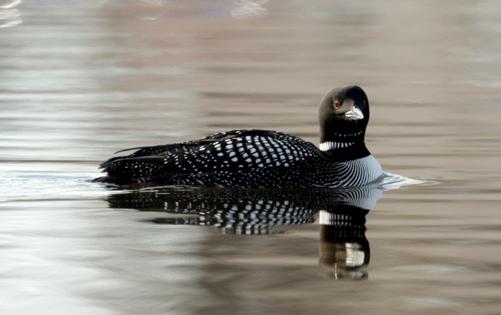Fewer loon chicks surviving because of climate change, researchers say
Published in Science & Technology News
For three decades, David Johnson has guided nature lovers in early spring to northern Illinois lakes to hear the eerie yodeling of hundreds of common loons.
Within the next 30 years, however, there may be few if any migrating loons in Illinois, according to Walter Piper, researcher and professor of biology at Chapman University in Orange, California.
Loons, which winter along the Atlantic and Pacific coasts and migrate through the Midwest to nest farther north, are not successfully raising as many chicks as they have in the past, said Piper, who has studied the birds in Wisconsin for years.
“Increased rainfall associated with climate change is washing organic matter into northern Wisconsin lakes, reducing water clarity, and making it harder for adult loons to find food for their chicks,” Piper said.
One of Piper’s studies, published last month in the journal Ecology, suggests that climate change, through water clarity, profoundly affects freshwater ecosystems. The extra moisture has also increased the population of black flies, which can disrupt nesting loons.
“Climate change could result in long-term decline of the loons and their breeding ranges,” predicted Piper, who runs the Wisconsin Loon Project. “We could lose all U.S. breeding populations. We could only have loons breeding in Canada. That would be tragic.”
Loon reproduction, however, is also declining across southern Canada, where the Canadian Lakes Loon Survey has been tracking the breeding habits for the past 40 years.
“The number of babies just goes down and down and down,” said Doug Tozer, director of waterbirds and wetlands for the conservation organization Birds Canada, which coordinates the loon survey.
The reasons are unclear, but Tozer said he thinks the decrease in Canada is related to warming temperatures causing a rise in mercury pollution. Tozer has co-authored papers looking into the connection between the drop in the loon population and mercury, acid rain and climate change, among other factors.
“The number of breeding loons in southern Canada is also starting to decline. This is what we’ve all been dreading,” said Tozer, who has joined forces with Piper to work on a project analyzing all loon data from North America.
...continued
©2024 Chicago Tribune. Visit at chicagotribune.com. Distributed by Tribune Content Agency, LLC.










Comments